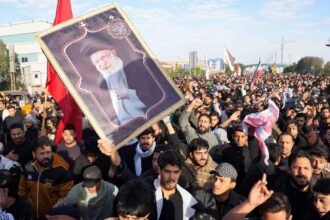Pakistani officials announced late Tuesday that talks between their representatives and the Taliban in Istanbul have failed. Pakistan’s Information Minister Attaullah Tarar said in a message that no progress was made in the Istanbul talks. He wrote on his social media platform that no solution was found in the Istanbul talks.
Pakistan’s Defense Minister Khawaja Asif claimed that the Taliban representatives in Istanbul lacked authority. In an interview with a private Pakistani TV channel, Khawaja Asif also alleged that India is waging a proxy war against Pakistan through Afghanistan.
The Taliban have not yet commented on the failed Istanbul talks or the Pakistani officials’ new claims. However, Taliban’s Interior Ministry spokesperson Abdul Matin Qani responded to Defense Minister Khawaja Asif’s recent warning, saying that if both sides don’t reach an agreement, it could lead to an “open war.” Qani said any attack would be met with a response that would “teach Pakistan a lesson and send a message to others.”
Spokesperson Qani added, “It’s true we don’t have nuclear weapons, but neither NATO nor the United States was able to control this country despite 20 years of war.”
Relations between Kabul and Islamabad have been strained in recent years due to mutual accusations. Pakistan accuses Afghanistan of sheltering militant groups that carry out attacks on Pakistan, a charge Kabul consistently denies.
Iran’s President has offered a peace proposal between Afghanistan and Pakistan.
Iran’s President offered to help resolve the violence between Kabul and Islamabad. Masoud Pezeshkian met with Pakistan’s Interior Minister Mohsin Naqvi on the sidelines of the Economic Cooperation Organization (ECO) summit and expressed readiness to facilitate easing tensions between Kabul and Islamabad.
Pezeshkian said Islamic countries should work together to reduce conflicts and maintain “unity” against common threats, emphasizing the need for efforts to prevent crises in the region. He made this offer as talks between the Taliban and Pakistani government in Istanbul stalled for the third day.
Pakistan’s Interior Minister Mohsin Naqvi described the recent talks between Pakistan and Afghanistan in Istanbul as “constructive” in his meeting with Iran’s President, but emphasized that differences should be resolved through peaceful dialogue.
Naqvi stressed that regional tensions should not escalate further, as both countries are still blaming each other for the failure of talks.
Pakistan’s Interior Minister told Iran’s President that “terrorism” and “migration” are shared concerns for both Iran and Pakistan, adding that the current cooperation between the two neighbors will yield effective results.
The third day of talks between the Taliban and Pakistani representatives in Istanbul also apparently ended without results.
Reports indicate that the talks between the Taliban and the Pakistani government’s representatives in Istanbul have ended without results for the third day. Officials had previously stated that the talks would last for three days. A private Afghan TV channel, reported citing a Taliban source, that they had tried to find a solution to the differences, but claimed the Pakistani side did not have the same intentions.
The source also claimed that the Pakistani delegation members were not coordinated among themselves and instead of negotiating, they tried to deviate from the discussion. According to the source, during the talks, the Pakistani side asked the Taliban representatives to allow Pakistan to launch attacks against the Pakistani Taliban in Afghanistan.
The source saying that the Pakistani side admitted for the first time that it has signed an agreement with another country, allowing that country to conduct drone strikes, and that Pakistan cannot prevent such attacks because it cannot break the agreement. The report does not mention the name of the country.
The Pakistan media reported, citing sources, that the Taliban rejected Pakistan’s main demand for specific action against militant groups operating on Afghan soil. The e reports, citing informed sources, that both sides held talks on Monday but reached no conclusion as the Taliban refused to provide written guarantees.
A Pakistani security source told that problems persisted on the third day of talks, as the Taliban rejected Pakistan’s demands, which the source described as legitimate. According to the report, Pakistan did not soften its stance in the talks, insisting that any cooperation with the Taliban government would depend on Kabul taking concrete actions against the Tehrik-i-Taliban Pakistan, Baloch separatist militants, and other groups.
Taliban government spokesperson Zabihullah Mujahid said yesterday that talks between the two sides are ongoing, but added that he cannot predict the outcome until the meeting concludes.
Mr. Mujahid emphasized that dialogue and mutual understanding are the only ways to resolve the latest crisis with Pakistan. However, the news report citing two Pakistani security sources, reports that progress in the talks depends on the Taliban’s positive stance.
The sources, whose identities are not disclosed, have accused Taliban negotiators of being stubborn and claimed they are not serious about the talks. According to reports, the Taliban representatives are asking the Pakistani side to stop violating Afghanistan’s airspace and to cease supporting opposition groups. However, the Pakistani side is demanding concrete action from the Taliban against the Tehrik-i-Taliban Pakistan (TTP), which Islamabad claims is launching attacks from Afghan soil.
It is stated that the Taliban has maintained a policy of negotiations and “pragmatism,” but told Islamabad that it cannot guarantee Pakistan’s security nor represent the Tehreek-e-Taliban Pakistan (TTP) militant group. The statement adds that Pakistan’s insecurity is an internal matter for that country and Islamabad should resolve it on its own.
Meanwhile, on October 28 in Tehran, Pakistan’s Interior Minister Mohsin Naqvi said during a meeting with the Taliban’s Deputy Interior Minister Mullah Mohammad Ibrahim Sadr that problems would be resolved through dialogue.
Peace and ceasefire talk between the two countries began in Doha, Qatar, one day after the Taliban government’s state-run Radio Television Afghanistan reported that 10 people, including women and children, were killed and 13 others injured in Pakistani airstrikes on October 17 evening in the Argon and Barmal districts of Paktika province.
Clashes then occurred between Pakistani troops and the Taliban’s government forces in Afghanistan on October 11-12 and again on October 14-15, resulting in casualties on both sides. On the evening of October 15, a 48-hour ceasefire was agreed upon between the Taliban government and Pakistan, and it was later decided that the ceasefire would remain in place until peace talks in Qatar.







